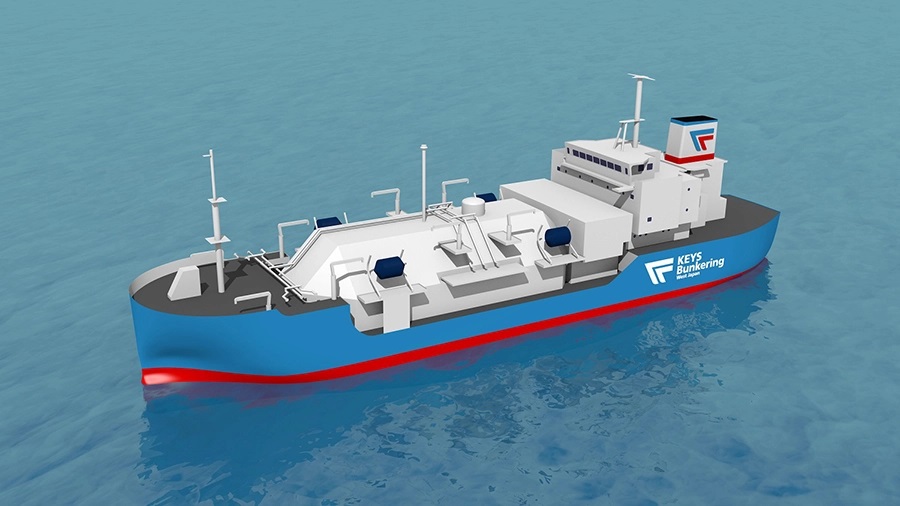Contract with Joint Venture Firm Operating an LNG Fuel Supply Business in the Kyushu and Setouchi Regions
- Construction of an LNG bunkering vessel to supply LNG fuel to ships will support the LNG conversion of marine vessels, and reductions in greenhouse gas emissions.
- Ship to be equipped with a dual fuel engine capable of using both LNG and heavy oil, a first for an LNG bunkering vessel in Japan.

Mitsubishi Shipbuilding Co., Ltd., a part of Mitsubishi Heavy Industries, Ltd. (MHI) Group based in Yokohama, has concluded a contract with KEYS Bunkering West Japan Co., Ltd. for construction of a liquefied natural gas (LNG) bunkering vessel, the first to operate in western Japan. The vessel will be built at the Enoura Plant at MHI’s Shimonoseki Shipyard & Machinery Works in Yamaguchi Prefecture, with completion and handover scheduled for March 2024.
LNG bunkering vessels supply LNG to LNG-fueled vessels. The use of LNG propulsion for ships is attracting attention as a solution for compliance with regulations aimed at reducing greenhouse gas (GHG) emissions. The planned LNG bunkering vessel will have an electric main engine, and be equipped with a dual fuel engine capable of using both LNG and heavy oil as fuel, a first for an LNG bunkering vessel in Japan. When operating in gas mode, it will provide exceptional environmental performance with considerably reduced emissions of carbon dioxide (CO2), nitrogen oxide (NOx), sulfur oxide (SOx), and particulate matter (PM).
KEYS Bunkering West Japan is a joint venture company established in February 2022 to supply LNG fuel for ships in the Kyushu and Setouchi Regions, with investment from Kyushu Electric Power Company, Inc. NYK Line, ITOCHU ENEX CO., LTD., and SAIBU GAS CO., LTD.
Mitsubishi Shipbuilding, as part of MHI Group’s strategic initiatives for energy transition, will make use of the gas handling technologies and experience it has accumulated from building LNG carrier vessels. Through this business project involving low environmental-impact LNG fuel, Mitsubishi Shipbuilding, as a maritime system integrator, aims to further the decarbonization of the marine industry, and realize a carbon neutral world.
Overview of the LNG Bunkering Vessel:
| Length overall (LOA) | Approx. 82.4 meters |
| Beam | Approx. 18.2 meters |
| Draft | Approx. 4.8 meters |
| Gross tonnage | Approx. 4,850 tonnes |
| LNG tank capacity | Approx. 3,500 m3 |
| Propulsion system | Electric propulsion |